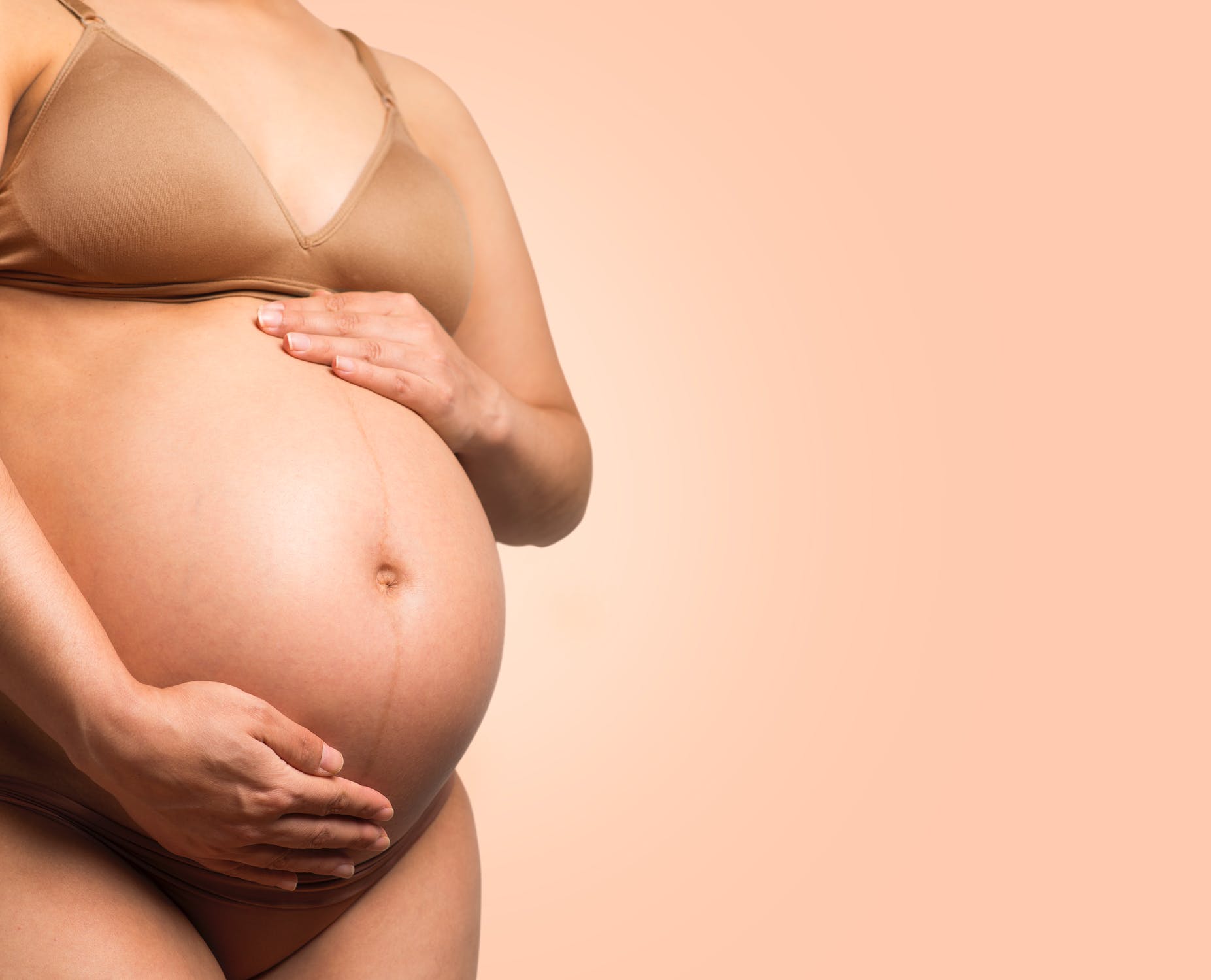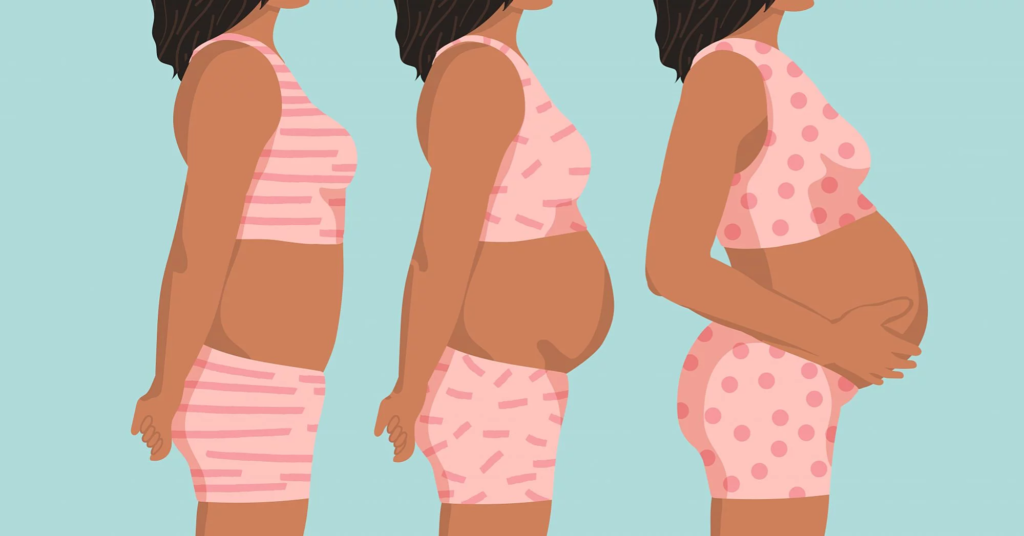
So Are You Really Gaining Just Pregnancy Pounds?
For those fortunate enough to be carrying a new life within them, it’s only natural to want to find out how much weight should you gain during pregnancy.
The answer is going to be pretty standard with everyone, though each person will carry that weight a little differently.
For most of your life, you have had the idea that weight gain is bad, but when you are pregnant, weight gain is a very good thing because it is a sign of a healthy baby.
For the most accurate answer to the question, you should consult your health care professional, but this article will give you and idea of what to expect.
The answer is largely going to vary somewhat from person to person based on their body size and fitness prior to pregnancy.

Those who are underweight should gain more than those who are overweight.
Underweight women should expect to gain anywhere from 28-40 pounds (ca. 18 kg). The average weight person should gain 25-35 pounds (ca. 16 kg), and the overweight woman should gain around 15-25 pounds (ca. 11 kg).
You should expect on gaining only about three or four pounds in the first trimester and then about a pound per week of the pregnancy. This, of course, will be more in those who are carrying multiples.
Here is a breakdown of how that extra weight is distributed.
– About 8 pounds of this will be baby, eventually. This will be different for each child, but the average weight will be around 8 pounds.
-About 2-3 pounds of this will be placenta.
-Another 2-3 pounds will be amniotic fluid.
-2-3 pounds will be extra breast tissue.
-4 pounds of this will be extra blood supply.
-Anywhere from 5 -9 pounds will be in extra fat for the delivery and breastfeeding.
-The last 2-5 pounds will be due to the increase in size of the uterus.
If you think you are gaining too much weight, discuss it with your health care professional.
Most likely you aren’t gaining too much weight and if you are you should never try to lose weight.
Just attempt to correct your caloric intake.
If you do lose weight drastic weight, it could have a negative effect on the development of your baby.
You should be keeping your healthcare professional in the loop about all changes going on so they can make sure that the baby is healthy.
If you are worried about not gaining enough weight, try to eat more often during the day.
Keep quick and ready eat snacks nearby so that you can take care of those hunger pangs that seem to come up suddenly.
We must get away from the old thought processes of weight gain and pregnancy.
There is no reason to have 50lbs of residual weight after you’ve delivered your baby. This is just weight that has accumulated, due to unhealthy excessive eating that your baby no longer received benefit from.
Many women use pregnancy as a reason to eat their heart out with copious amounts of food on a daily basis.
I’ve heard of women gaining 70 and 80 lbs during pregnancy, which just isn’t necessary and is going to place you in a difficult transition of body image after giving birth… being left with the body you’ve never had before or seen before.
Here’s A Wellness Course on Pregnancy & Fitness…
Yes, the health of your baby is most important. But after being mothers, we are still humans.
So self-image, body image and self-esteem are still very important factors of being a healthy and happy mom.
Breastfeeding will increase weight loss and help you return to a lower body weight, but it is not going to drastically decrease huge amounts of excessive weight.
Being mindful of your diet even during pregnancy is very important whether we’re talking about nutritional foods being consumed, avoiding processed foods with chemicals and preservatives. Or being conscious of the amount of calories we are taking in.
It truly takes only a yogurt to increase your daily calories and give your developing baby the nutrients and calories it also needs.
So how many calories exactly?
You are supposed to be eating around 100-300 more calories per day when you are pregnant than before pregnancy.
So eat foods that are high in protein and that will put you at the amount of calories you should be eating daily.
Remember you are NOT EATING FOR TWO!😋
Just an extra 100-300 calories a day.
Add the extra on everything, when you eat. Eat more gravy, more ketchup, and more cheese. Slight ways to find those extra calories.
What type of foods should you be consuming while pregnant?
As your baby is developing, you must consume foods that your body knows how to break down and what to do with, which would be whole foods. Foods from the Earth.
Foods that our bodies can identify and have the natural chemical processes to break it down efficiently and correctly, sending necessary nutrients to your growing baby.
So when I make a classification of whole foods, I’m referring to foods that grew from the ground, not formed in a factory. So anything in the produce section, buying organic whenever possible, but should be more times than not.
If it can survive on the shelf unopened for two years, that’s something you should not be eating at all or very often… during pregnancy or anytime after.
When it comes to meats, you should only be consuming all natural meat, meat without hormones or steroids.
Avoiding red meat all together would be a very healthy practice.
So by sticking to the meat department and the produce department, making healthy choices there as well. You’re giving your baby a chance to naturally develop in a healthy manner.
Eating excessive processed foods with man-made chemicals and preservatives can present detrimental to your forming baby.
Why not give your baby the highest chance to come out as perfectly imperfect as possible.
Here are Great Organic Prenatal Vitamins, A Non-GMO Supplement:
In everything during your pregnancy, keep your health care professional apprised of what is happening. Express all concerns you have and ask for advice.
They will be the ultimate authority on questions like how much weight you should gain during pregnancy. Keep your Ob-Gyn updated on all of your habits, questions and concerns. They will be your guiding light to a healthy and successful pregnancy, labor and delivery.
Bottom line.
A healthy amount of weight gain during pregnancy all depends on your pre-pregnancy weight. But on average and this is all determined by your BMI, weight gain should not exceed 35-40 lb. Which takes into account the baby’s weight, as well as changes in the physiology of your body.
By making healthy food choices and avoiding overly processed foods and junk, this will directly impact how much weight is gained as well as most importantly give your baby the necessary nutrients, minerals and vitamins for healthy development.



Leave a Reply